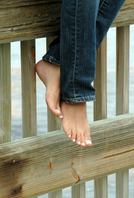Swollen Feet

What are Swollen Feet? Swollen ankles and swollen feet are common and usually are not a cause for concern, particularly if you have been standing or walking a lot. But feet and ankles that stay swollen or are accompanied by other symptoms could signal a serious health problem.
Swollen feet is a condition where the muscles and tissues in the feet have an excessive build up of fluid. Gravity pulls the fluids down into your feet and ankles, causing them to swell. This buildup can lead to a rapid increase in weight over a short period of time.
Slight swelling of the lower legs commonly occurs in warm summer months. Slight swelling is more likely to occur if a person has been standing or walking a lot.
See a doctor if you have persistent swelling, swelling accompanied by shortness of breath and weight gain, or swelling that damages the skin or if you have specific medical conditions or concerns.
Treatment
Prevention
Prevention in most people can be as simple as avoid sitting or standing without moving for prolonged periods of time and keeping your feet cool. Other ways to prevent swelling may include stretching your legs often, getting up to walk when possible when travelling, avoiding restrictive clothing around your ankles and thighs, and regular exercise.
Related Articles
- Smelly Feet
- Common Skin Conditions
- Blisters
- Foot Pain
- Our Clinics
- Other Foot and Ankle Conditions
Swollen feet is a condition where the muscles and tissues in the feet have an excessive build up of fluid. Gravity pulls the fluids down into your feet and ankles, causing them to swell. This buildup can lead to a rapid increase in weight over a short period of time.
Slight swelling of the lower legs commonly occurs in warm summer months. Slight swelling is more likely to occur if a person has been standing or walking a lot.
See a doctor if you have persistent swelling, swelling accompanied by shortness of breath and weight gain, or swelling that damages the skin or if you have specific medical conditions or concerns.
Treatment
- Elevate your legs above the level of the heart to help drain away the excess fluid.
- Keep your feet cool in the summer months.
- Watch your salt intake. Try to follow a low-salt diet, which may reduce fluid retention and swelling
- Stay active. Exercise your legs to help pump fluid from your legs back to your heart.
- Maintain a healthy weight.
- If you think there is more serious cause to your swollen feet, see your GP or Podiatrist. The sooner the cause is identified and treated, the less potential damage to your circulatory system occurs.
Prevention
Prevention in most people can be as simple as avoid sitting or standing without moving for prolonged periods of time and keeping your feet cool. Other ways to prevent swelling may include stretching your legs often, getting up to walk when possible when travelling, avoiding restrictive clothing around your ankles and thighs, and regular exercise.
Related Articles
- Smelly Feet
- Common Skin Conditions
- Blisters
- Foot Pain
- Our Clinics
- Other Foot and Ankle Conditions


